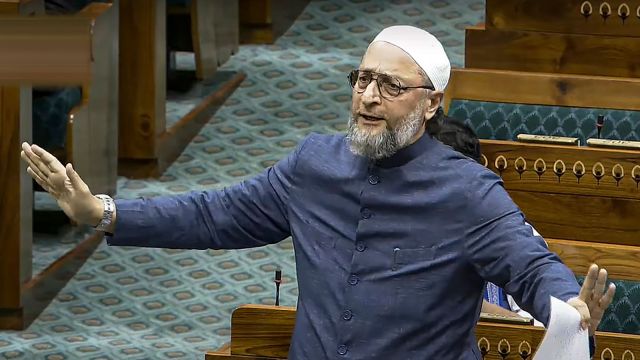It’s hard to tell whether one should laugh, cry, or roll one’s eyes at Asaduddin Owaisi’s latest outburst on the Waqf (Amendment) Act, 2025. The AIMIM supremo and barrister, who never misses a chance to turn a legal issue into political theatre, seems to believe that the Supreme Court might still pull a rabbit out of the constitutional hat—even after Parliament has spoken, and the President has signed the law into existence.
Let’s be clear. The Supreme Court, for all its judicial wisdom, is not the third chamber of Parliament. Legislating is the job of elected lawmakers. And unless someone has amended Article 245 of the Constitution in secret, that job still belongs to the Legislature, not the Judiciary. Which begs the question: is Mr Owaisi reading the Indian Constitution or a colonial-era British textbook?
The irony is rich. A sitting MP, sworn to uphold the Constitution, pining for the Court to override a law passed by the very Parliament he is part of. A law, mind you, that is not some backdoor ordinance but a product of due process—scrutinized, debated, and passed after recommendations from a Joint Parliamentary Committee.
The Centre, perhaps tiring of the constitutional ping-pong, has submitted a massive 1,332-page preliminary counter-affidavit. That’s not a typo—1,332 pages. Filed by Shersha C. Shaik Mohiddin, Joint Secretary, Ministry of Minority Affairs, the affidavit politely but firmly shuts down the petitions challenging the Waqf (Amendment) Act. The government’s stance? The Act is a necessary, transparent, and secular reform to curb rampant misuse of waqf provisions and manage the spiralling growth of waqf properties.
Let’s talk numbers. Before the 2013 amendment, India had about 18.3 lakh acres of waqf land. Post-2013? That number mysteriously ballooned by another 20.9 lakh acres. Over 116% growth, and not because the land multiplied like loaves and fishes. The affidavit attributes this explosion to the misuse of clauses like waqf-by-user and the Waqf Boards’ unchecked power to declare any land as waqf, often without contest or notice. Private and public lands—government properties included—have been quietly claimed under this sweeping provision.

And this is what Mr Owaisi wants to defend?
Even more telling is the government’s assertion that the Waqf Act amendments do not infringe on Articles 25 and 26—constitutional guarantees for religious freedom. Instead, the reforms are aimed at improving administrative accountability and preventing religious trusts from turning into parallel land ministries. The changes are secular in spirit, regulatory in nature, and the larger public interest.
One would think a lawmaker would appreciate the separation of powers. The Centre gently reminded the Court that Parliament-enacted laws come with a presumption of constitutionality. That presumption, it argued, becomes stronger when such laws are a product of detailed parliamentary deliberation. The message to the Court? Don’t jump the gun with interim orders. Let the law function unless there is clear, demonstrated harm.
And if Mr Owaisi needed a further reality check, he could look at President Droupadi Murmu’s stern stance when the same Supreme Court bench appeared to challenge the constitutional role of the Governor in the Tamil Nadu Bill controversy. When even the President isn’t amused, perhaps it’s time for the judiciary to reassess its overreach.
Yet, here’s Owaisi, peddling the idea that the Supreme Court can still overrule Parliament. Either he doesn’t understand constitutional limits, or he’s playing to the gallery, trying to appease his vote bank with fantasies rather than facts. Maybe he’s hoping that outrage will compensate for legal logic.
But to suggest that the Supreme Court can, or should, reverse a law passed by Parliament and signed by the President, without any fundamental rights violation, is not just wrong, it’s misleading. And when it’s done by someone with a legal degree from London and a Lok Sabha seat from Hyderabad, it’s not just ignorance; it’s mischief.
So, Mr Owaisi, while you continue to live in your legal la la land, the rest of us would like our lawmakers to act like lawmakers, not courtroom crusaders chasing illusions. There’s a fine line between dissent and distortion. And you, sir, have crossed it.







